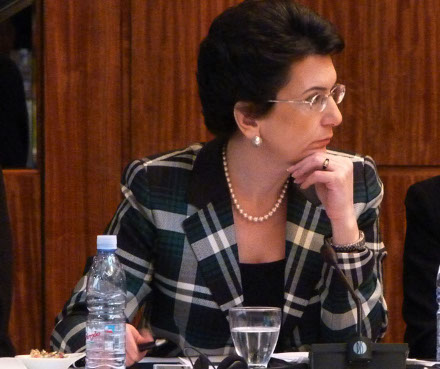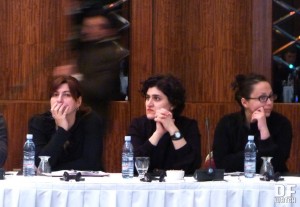
TBILISI, DFWatch – Democracy campaigners in the former Soviet republic of Georgia call for international observers to come and monitor what’s going on. They believe the Saakashvili government is setting things up to rig the election for parliament this fall.
Last election, in May 2008, the Organization for Security and Cooperation in Europa (OSCE) sent their personnel six weeks before election day. But activists believe that will be too late this time to really catch on to the games now being played.
They ask for OSCE’s people to come right away, before an election environment has been devised that is overly favorable to the sitting government of President Mikheil Saakashvili.
The groups have come together under the slogan ‘This Affects You Too’, because part of the problem is a new set of party financing rules which in theory might be used against just about anybody.
Today they met with local and international organizations and political parties to present their alternative to how the law could have been made without harming basic democratic rights and scaring the population away from exercising their constitutional rights to select who is going to rule them.

As a sign of how seriously they view the development, people signed a petition to the OSCE Secretary General, asking for long-term observers to not wait for President Saakashvili’s invitation, but come to Georgia now and help prevent potential problems.
The campaigners also sent the petition to Saakashvili, to the parliamentary speaker and the foreign affairs minister, asking them too to deploy OSCE not only just in the election campaign, but starting right now.
The ‘This Affects You Too’ campaign was started February 13 by local groups and media united under the goal of amending the legislation which sets up the rules of the game for this year’s election.

Attracting most of the attention are a new tough party financing regulation ushered in late last year, called ‘the law about political unions of citizens’. It applied a number of restrictions to political parties, but also to legal and individual persons. The law, opponents say, poses a threat to every citizen and even involves criminal responsibility in certain cases, mainly connected to giving away or receiving financing.
The government claimed the amendments were directed at making the party financing system more transparent and reduce the risk of corruption. But the rules are vague, and suspicion is strong that they will be applied arbitrarily. Support for such suspicions were strengthened today, as Transparency International presented a list of 17 instances of violation of the new rules, also violations of new sections in the Criminal Code, which authorities have been informed about, but not reacted to. The list consists of politicians and public officials who have given gifts to people, which is illegal to do for a political person under the new rules.
Instead of checking these politicians, the Chamber of Control has gone after groups that conduct election monitoring and are only tangentially involved in politics. The woman in charge of this work, Natia Mogeladze, is seen among the opposition as a kind of attack dog for the ruling National Movement party, not a neutral public servant.

The brain behind the new rules, Pavle Kublashvili, confronted his critics today at Tbilisi’s Sheraton Metekhi Palace Hotel. He said that after a verbal skirmish last night with campaigners there might be some changes, but campaigners say yesterday’s meeting ended without progress.
Pavle Kublashvili, who heads parliament’s judiciary committee, expressed hope that there will be agreement and said the party he represents, Saakashvili’s National Movement, also has its own ideas about possible changes to the legislation.
“But the spirit of the law will remain the same. I mean that the goal of the law will still be that any financing which is related to political activity and politics should be transparent and the same actions implemented by avoiding the law should be punished,” Kublashvili said.
He does not share campaigners’ concern that the rules are might threat democratic rights.
“Practice has shown that this law is only used for political party transparency,” he says, adding that if any of the articles in the law is vague then it can just be made clearer.

One of the main problems, campainers say, is the term ‘related person’. The law about party financing applies the same restrictions as for political parties to persons directly or indirectly connected to a political party, person or process.
They say it gives wide room for interpretation, and it’s unclear to whom specifically the law applies.
Another thing is that the law applies to a person who has declared his political goals, and someone who has expressed a political opinion. Their alternative law suggests applying restrictions only to someone who has expressed goals of taking part in an election, and not generally to anyone who says something political.
One of the main problems is that the adopted amendments apply criminal responsibly to voters for these violations. Technically, it is classified as bribe, which carries a penalty of up to three years in jail.
If a voter receives money or some other kind of help or present from a political party, he or she will be punished. The initiative group suggests canceling the voters’ punishment and applying it to situation where a political party gives away what can be called bribes; in other words, vote-buying.
Georgian Young Lawyers Association, International Society for Fair Elections and Democracy, Transparency International , Coalition for Free choice and the other groups campaigning for the early arrival of OSCE observers write in their petition that the law ‘restricts civil activism, property rights, freedom of speech and political activity, hinders the country’s democratic development, applies difficult and unjust obligation to the voter; grants undefined and unconstitutional authority to the main controller of party financing, the Georgian Chamber of Control, creates serious dangers for each citizen, as well as for civil society, including the media; worsens the election environment in the country.’
Nino Burjanadze, former parliamentary speaker who led the rose revolution alongside Saakashvili and Zurab Zhvania, surprisingly turned up at the meeting, causing some discomfort among organizers, who had said everyone was welcome to join in. The campaigners hope to maintain cohesion, while Burjanadze is a famously divisive character who has struggled to get back into the political spotlight after being blamed by some of her supporters for mismanagement of a protest campaign last spring, which ended in some of her followers being imprisoned for up to ten years in a broad crackdown by authorities.
Burjanadze calls it a draconian law which creates problems for political parties with even getting into the election process. She supports amending the law, but says amending it will not be enough.
“There are really clever people in the government, who perfectly manage to use the noble initiatives for their own, which may come from the non-governmental sector or the opposition,” she said. Burjanadze thinks the law will be amended but just as a PR exercise.
During the discussion Shorena Shaverdashvili, editor of the weekly magazine Liberali, questions if it really will help even to make the changes campaigners are calling for.
“We don’t have the illusion that these changes will improve the whole environment. The campaign ‘This Affects You Too’ doesn’t only have to do with this law. We will work to improve the other laws too, which will finally give some progress in this direction,” answered Irakli Melashvili, a member of the Coalition for Free Choice.
Burjanadze said legislation is not enough; it’s also necessary with freedom of the media, court independence, independence of election observers, no pressure towards business and prevent that the police is used for political ends.

